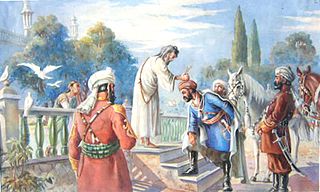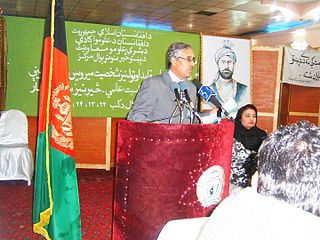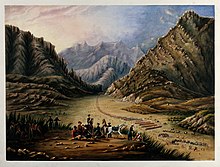
Ahmad Shāh Durrānī, also known as Ahmad Shāh Abdālī, was the founder of the Durrani Empire and is often regarded as the founder of the modern Afghanistan. In June 1747, Ahmad Shah was appointed as King of the Afghans by a loya jirga in Kandahar, where he set up his capital. Primarily with the support of the Pashtun tribes, Ahmad Shah pushed east towards the Mughal and Maratha Empires of India, west towards the disintegrating Afsharid Empire of Iran, and north towards the Khanate of Bukhara of Turkestan. Within a few years, he extended his control from Khorasan in the west to North India in the east, and from the Amu Darya in the north to the Arabian Sea in the south.

Pashtuns, also known as Pakhtuns, or Pathans, are a nomadic, pastoral, Eastern Iranic ethnic group primarily residing in northwestern Pakistan and southern and eastern Afghanistan. They historically were also referred to as Afghans until the 1970s, after the term's meaning had become a demonym for members of all ethnic groups in Afghanistan.

Dari, also known as Dari Persian, is the variety of the Persian language spoken in Afghanistan. Dari is the term officially recognised and promoted since 1964 by the Afghan government for the Persian language; it is known as Afghan Persian or Eastern Persian in many Western sources. The decision behind renaming the local variety of Persian was more political than linguistic to support an Afghan state narrative. Apart from a few basics of vocabulary, there is little difference between formal written Persian of Afghanistan and Iran; the languages are mutually intelligible. The term "Dari" is officially used for the characteristic spoken Persian of Afghanistan, but is best restricted to formal spoken registers. Afghanistan's Persian-speaking population still prefer to call their language "Farsi", asserting that the term "Dari" has been imposed upon them by the dominant Pashtun ethnic group as an effort to detach Afghanistan from its deep-rooted cultural, linguistic, and historical connections with the wider Persian-speaking world, encompassing Iran, Tajikistan, and parts of Uzbekistan. Dari is the official language for 35 million Afghans in Afghanistan and it serves as the lingua franca for interethnic communications in Afghanistan.

Pashtunistan is a region located on the Iranian Plateau, inhabited by the indigenous Pashtun people of southern Afghanistan and northwestern Pakistan, wherein Pashtun culture, the Pashto language, and Pashtun identity have been based. Alternative names historically used for the region include Pashtūnkhwā (پښتونخوا), Pakhtūnistān, Pathānistān, or simply the Pashtun Belt.

Pashto is an Eastern Iranian language in the Indo-European language family, natively spoken in northwestern Pakistan, southern and eastern Afghanistan, and some isolated pockets of far eastern Iran near the Afghan border. It has official status in Afghanistan and the Pakistani province of Khyber Pakhtunkhwa. It is known in historical Persian literature as Afghani.

Kandahār is one of the thirty-four provinces of Afghanistan, located in the southern part of the country, sharing a border with Pakistan, to the south. It is surrounded by Helmand in the west, Uruzgan in the north and Zabul Province in the east. Its capital is the city of Kandahar, Afghanistan's second largest city, which is located on the Arghandab River. The greater region surrounding the province is called Loy Kandahar. The Emir of Afghanistan sends orders to Kabul from Kandahar making it the de facto capital of Afghanistan, although the main government body operates in Kabul. All meetings with the Emir take place in Kandahar, meetings excluding the Emir are in Kabul.

Persian literature comprises oral compositions and written texts in the Persian language and is one of the world's oldest literatures. It spans over two-and-a-half millennia. Its sources have been within Greater Iran including present-day Iran, Iraq, Afghanistan, the Caucasus, and Turkey, regions of Central Asia, South Asia and the Balkans where the Persian language has historically been either the native or official language. For example, Rumi, one of the best-loved Persian poets, born in Balkh or Wakhsh, wrote in Persian and lived in Konya, at that time the capital of the Seljuks in Anatolia. The Ghaznavids conquered large territories in Central and South Asia and adopted Persian as their court language. There is thus Persian literature from Iran, Mesopotamia, Azerbaijan, the wider Caucasus, Turkey, Pakistan, Bangladesh, India, Tajikistan and other parts of Central Asia, as well as the Balkans. Not all Persian literature is written in Persian, as some consider works written by ethnic Persians or Iranians in other languages, such as Greek and Arabic, to be included. At the same time, not all literature written in Persian is written by ethnic Persians or Iranians, as Turkic, Caucasian, Indic and Slavic poets and writers have also used the Persian language in the environment of Persianate cultures.
The Yusufzai or Yousafzai, also referred to as the Esapzai, or Yusufzai Afghans historically, are one of the largest tribes of ethnic Pashtuns. They are natively based in the northern part of Khyber Pakhtunkhwa, to which they migrated from Kabul during the 16th century, but they are also present in smaller numbers in parts of Afghanistan, including Kunar, Kabul, Kandahar and Farah. Outside of these countries, they can be found in Ghoriwala District Bannu, Balochistan Sibi (Akazai), Chagai (Hassanzai) and Rohilkandh.

The culture of Afghanistan has persisted for over three millennia, tracing record to at least the time of the Achaemenid Empire in 500 BCE, and encompasses the cultural diversity of the nation. Afghanistan's culture is historically strongly connected to nearby Persia, including the same religion, as the people of both countries have lived together for thousands of years. Its location at the crossroads of Central, South and Western Asia historically made it a hub of diversity, dubbed by one historian as the "roundabout of the ancient world".

The Durrānī, formerly known as Abdālī (ابدالي), are one of the largest tribes of Pashtuns. Their traditional homeland is in southern Afghanistan, straddling into Toba Achakzai in Balochistan, Pakistan, but they are also settled in other parts of Afghanistan and parts of Khyber Pakhtunkhwa.

New Persian, also known as Modern Persian is the current stage of the Persian language spoken since the 8th to 9th centuries until now in Greater Iran and surroundings. It is conventionally divided into three stages: Early New Persian, Classical Persian, and Contemporary Persian.

The Pashto media includes Pashto literature, Pashto-language newspapers, magazines, television and radio stations, as well as Pashto films and Pashto internet. Pashto media involves the Pashtuns of Pakistan, Afghanistan and the Pashtun diaspora around the world.

Pashto literature refers to literature and poetry in Pashto language. The history of Pashto literature spreads over five thousands years having its roots in the oral tradition of Tappa. However, the first recorded period begins in 7th century with Amir Kror Suri. Later, Pir Roshan (1526–1574), who founded his own Sufi school of thoughts and began to preach his beliefs. He gave Pashto prose and poetry a new and powerful tone with a rich literary legacy. Khair-ul-Bayan, oft-quoted and bitterly criticized thesis, is most probably the first book on Sufism in Pashto literature. Among his disciples are some of the most distinguished poets, writers, scholars and sufis, like Arzani, Mukhlis, Mirza Khan Ansari, Daulat and Wasil, whose poetic works are well preserved. Akhund Darweza (1533–1615), a popular religious leader and scholar gave a powerful counterblast to Bayazid’s movement in the shape of Makhzanul Islam. He and his disciples have enriched the Pashto language and literature by writing several books of prose.

The Pashtun tribes, are tribes of the Pashtun people, a large Eastern Iranian ethnic group who speak the Pashto language and follow Pashtunwali, the social code of conduct for Pashtuns. They are found primarily in Afghanistan and Pakistan and form the world's largest tribal society, comprising over 60 million people and between 350 and 400 tribes and clans. They are traditionally divided into four tribal confederacies: the Sarbani (سړبني), the Bettani (بېټني), the Ghurghusht (غرغښت), the Karlani (کرلاڼي) and a few allied tribes of those that are Ismailkhel, Khel, Ludin, Sakzai, and Zai.
Pashtun nationalism is an ideology that claims that the Pashtuns form a distinct nation and that they should always be united to preserve their culture and homeland. In Afghanistan, those who advocate Pashtun nationalism favour the idea of a "Greater Afghanistan", which includes Khyber Pakhtunkhwa, and be ruled directly under Pashtun principles.

The name Afghānistān means "land of the Afghans", the name "Afghan" originally referred to the Pashtun people. which originates from the ethnonym Afghan. Historically, the name Afghan mainly designated Pashtuns, the largest ethnic group of Afghanistan. The earliest reference to the name is found in the 10th-century geography book known as Hudud al-'Alam. The last part of the name, -stān is a Persian suffix for "place".

Abdul-Hai Habibi was a prominent Afghan historian for much of his lifetime as well as a member of the National Assembly of Afghanistan during the reign of King Zahir Shah. A Pashtun nationalist from Kakar tribe of Kandahar, Afghanistan, he began as a young teacher who made his way up to become a writer, scholar, politician and Dean of Faculty of Literature at Kabul University. He is the author of over 100 books but is best known for editing Pata Khazana, an old Pashto language manuscript that he claimed to have discovered in 1944; but the academic community does not unanimously agree upon its genuineness.
Nāzo Tokhī, commonly known as Nāzo Anā, was an Afghan poet and writer in the Pashto language. Mother of the famous early-18th century Afghan king Mirwais Hotak, she grew up in an influential family in the Kandahar region. She is remembered as a brave woman warrior in Afghan history and as the "Mother of the Afghan Nation".

Massoud Nawabi also known as Ustad Nawabi, was an Afghan poet, writer, and founder of the Educational Committee for Afghan Refugees (ECAR), Afghan Cultural Center, Ghulam Habib Nawabi, Chief Administrator of the Afghan Ibn-e-Sina University and Principle of Ariana Mahajir High School. Massoud Nawabi was the Son of Ghulam Habib Nawabi, who was the last of the great Persian Poet and among the first to introduce modern Dari poetry to Afghanistan.

Afghan literature or literature of Afghanistan refers to the literature produced in the Islamic Emirate of Afghanistan. Influenced by Central and South Asian literature, it is predominantly written in two native and official languages of Afghanistan, Dari and Pashto. Some regional languages such as Uzbek, Turkmen, Balochi, and Pashayi also appears in Afghan literature. While Afghanistan is a multilingual country, these languages are generally used as oral compositions and written texts by the Afghan writers and in Afghan curriculum. Its literature is highly influenced by Persian and Arabic literature in addition to Central and South Asia.















